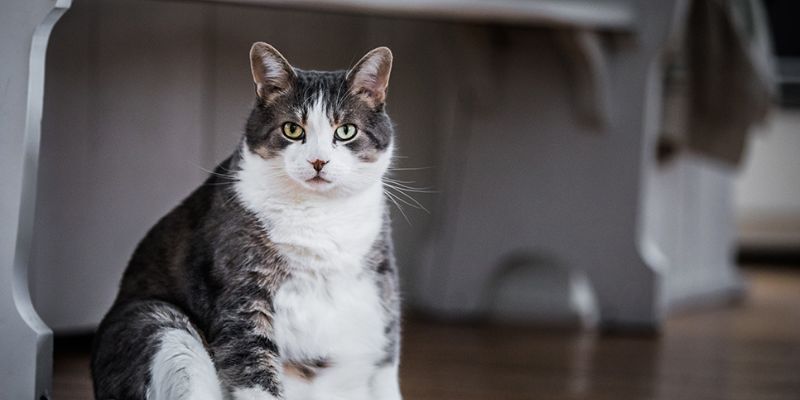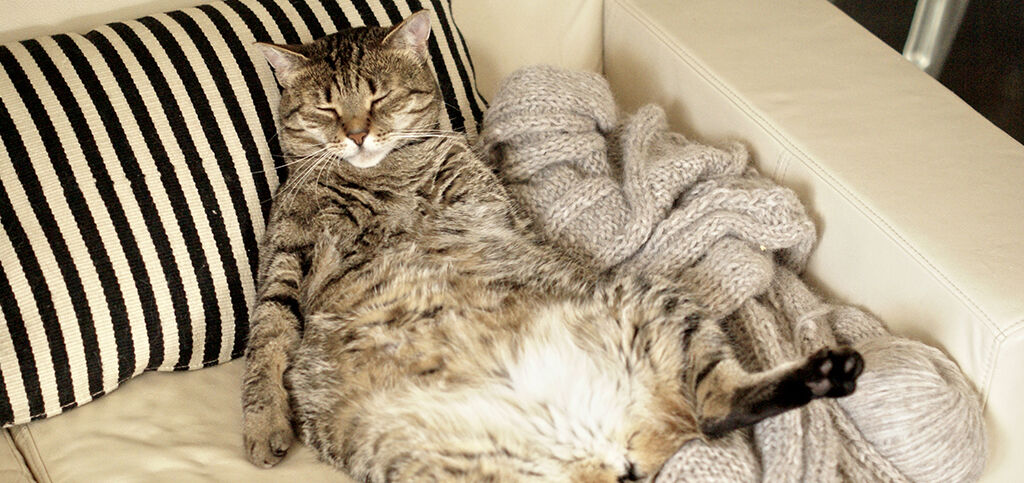You look at your cat, and you’re glad to see it’s happy, but then you think to yourself, ‘Has he put on some weight?’. Excess weight and obesity in cats is par for the course. The reasons for this are that cats usually live sedentary lives, and we often neglect their diets, providing them with inadequate nutrition. If you’re one of the many people wondering whether your cat is in fact fat, we’re here to provide you all the information you need to verify whether it is, and how to put a stop to it. This is really important because fat cats tend to develop illnesses that can reduce their life span and the quality of their life.
Causes and consequences of your cat being fat
Obesity is defined as the accumulation of fatty tissue (fat) in the body. Although it may not initially seem worrying, the accumulation of fat linked to being overweight can trigger changes to the body and organism that imply many risks for your cat’s health.
What causes obesity?
There are many reasons why your cat may be overweight. The most common of these are:
- Sterilization. It has been proven that neutered cats tend to put on weight due to a fall in the production of sex hormones, provoking a slowdown in their basal metabolism, with a consequent increase in levels of body fat and decrease in muscle mass. In addition, the decrease in sex hormones after neutering leads to an increase in appetite, for reasons that are still unknown, and a reduction of physical activity in your cat.
- Imbalance between the energy intake and burning of calories. In other words, your cat eats a lot but moves little.
- Unsuitable diet. Sometimes you just feed your cat without considering the fact it is growing up and its needs are changing. It is vital to adapt its diet to its nutritional needs.
- Sedentary lifestyle. Even if its diet is suitable, if it doesn’t move enough, your cat can slowly put on weight without you noticing.
- Hormonal imbalances.
- Genetics. Obesity is hereditary, as it may be linked to a genetic illness.
- Medicines.
- Stress due to routine change. This happens in exceptional cases, where the cat isolates itself and tends to eat more.
What are the consequences?
Your cat being overweight can have a significant impact on its quality of life. These are the most common consequences:
- Metabolic illnesses such as diabetes.
- Cardio-respiratory diseases.
- Reproductive disorders.
- Liver disorders such as a fatty liver.
- Urinary, osteoarticular, and dermatological problems.
- Growths
- Risks when under anaesthetic, if required.
- Intolerance to heat and exercise.

How can you tell if your cat is fat?
Although there is no standard measurement to define excess weight in cats, you can perform a check of their chest and see if you can feel their ribs, or conversely, if you notice excess fat.
The vet can provide you with an ideal weight chart for your cat according to its size and breed. If it exceeds the weight stipulated in these by 10-20%, then it is overweight. If it is more than 20% in excess of the parameters, it is obese.
How can excess weight be prevented?
There are several things you can do to control your cat’s body weight if you feel it has a tendency to be overweight. Here are a few:
- Take it for a check-up at the vet’s to rule out certain illnesses mentioned above in the causes section. If there is an underlying issue, the vet will proceed to the appropriate treatment.
- Choose your cat’s food carefully, based on its age, size, lifestyle and breed. Weigh out portions according to the packet or your vet’s recommendations, and avoid giving it treats and rewards. If your cat has been neutered, the best option is a food created specifically for this, such as the Ultima Sterilized dry cat food, which addresses its nutritional needs while controlling weight gain.
- Encourage physical activity. Play with your cat, go for a walk together, install multi-level scratching posts that encourage it to get moving, etc. Make home-made toys such as tunnels, balls of paper for it to chase, etc. Place its food bowl somewhere it has to jump up to reach, and use interactive dispensers that store the food inside and keep your cat active.
As you can see, excess weight can be dangerous for your cat, so avoid it at all costs! If your cat is looking a bit fat, remember that diet, exercise and preventative disease control is key. If you have any questions about its weight, speak to your vet.
 Copy link
Copy link
 Publish on Facebook
Publish on Facebook
 Publish on Twitter
Publish on Twitter
 Publish on WhatsApp
Publish on WhatsApp
